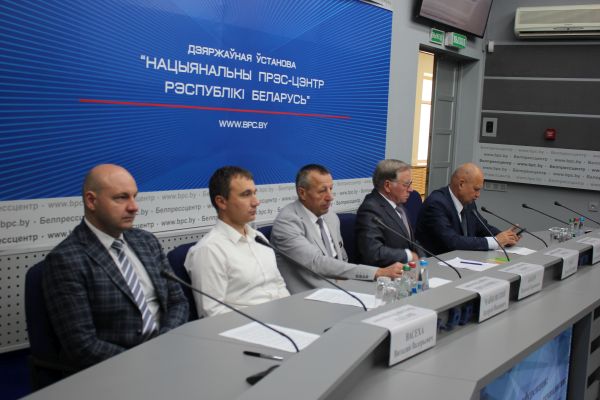

On July 31, 2024, the National Press Centre of the Republic of Belarus hosted a press conference on the New Agro-Industrial Technologies: the Contribution of Belarusian Scientists to the Development of Agriculture. The event was attended by: Bakach Nikolay Georgievich, Deputy Director General for Scientific Work of the Scientific and Practical Centre of the NAS of Belarus on Agricultural Mechanization; Tchaikovsky Andrey Ivanovich, Deputy Director General of the Scientific and Practical Centre of the NAS of Belarus on Potato and Fruit and Vegetable Growing; Vasekha Vitali Valeryevich, Deputy Director for Innovation of the Institute of Vegetable Growing of the NAS of Belarus; Urban Eroma Petrovich, First Deputy Director General for Scientific Work of the Scientific and Practical Centre of the NAS of Belarus on Agriculture; Budevich Alexander Ivanovich, Deputy Director General for Scientific Work of the Scientific and Practical Centre of the NAS of Belarus on Livestock; Komarova Natalia Viktorovna, Deputy Director General for Scientific Work and Standardization of the Scientific and Practical Centre of the NAS of Belarus on Food.
Representatives of the scientific and practical centres of the Department of Agrarian Sciences of the NAS told about the latest developments of scientists in the field of agro-industrial technologies.
Eroma Urban, First Deputy Director General of the Scientific and Practical Centre of the NAS of Belarus on Agriculture, spoke about the creation of new varieties of crops that are grown in our country: "As the results of the state variety testing show, individual grain varieties have productivity of up to 120 quintals per hectare. Rapeseed and legumes can produce 50-60 quintals per hectare. In recent years we have created a series of new varieties for all crops. At the same time, we are developing technological regulations for their cultivation in order to realize their genetic potential in production conditions."
Andrey Tchaikovsky, Deputy Director General of the Scientific and Practical Centre of the NAS of Belarus on Potato and Fruit and Vegetable Growing, told about the new potato varieties that are produced in Belarus. Among the novelties are the early varieties Piershacviet and Julija, which differ in the formation of a marketable harvest in the early harvest period. The tubers of the Piershacviet variety are well stored in winter. The Julija variety is suitable for industrial processing into chips and for vacuuming.
Nikolay Bakach, Deputy Director General for Scientific Work of the Scientific and Practical Centre of the NAS of Belarus on Agricultural Mechanization, told about import-substituting equipment for tillage in Belarus. "Tillage for sowing is one of the most responsible processes. These operations take up to 30–40 % of energy and up to 25 % of labor costs. For plowing soils in Belarus, a generation of new hull plows has been mastered today, which in terms of basic operational and energy indicators are not inferior to foreign analogues and are most effective on large areas," Nikolay Bakach noted.
The Institute of Vegetable Growing of the NAS of Belarus has one of the largest collections of fruit, berry, nut crops and grapes in Eastern Europe. To date, it amounts to more than 5.5 thousand samples. During the period of the institute's activity, 249 varieties were created here, 150 of which are still in the register and are relevant both for production and for amateur gardeners. Vitali Vasekha, Deputy Director for Innovation at the Institute, emphasized this during a press conference.
Alexander Budevich, Deputy Director General for Scientific Work of the Scientific and Practical Centre of the NAS of Belarus on Livestock, shared the most significant developments and promising projects in the field of livestock farming: "Experimental formulations of whole milk substitutes for calves of the dairy growing period and drinking schemes have been developed. This contributes to the most effective productivity of breeding livestock, provides high average daily gains, has a positive effect on feed intake and metabolic processes in the body of calves. The developed norms of the need for domestic Holstein cows in cleavable and non-cleavable protein at various stages of the physiological cycle, in minerals and vitamin D, micro- and macronutrients have been tested. The use of these norms contributes to the production of healthy calves, the increase in average daily milk yields and the stability of the lactation curve over time."
Natalia Komarova, Deputy Director General for Scientific Work and Standardization of the Scientific and Practical Centre of the NAS of Belarus on Food, told about the latest innovations and research directions in the field of food. At the moment, the Centre's specialists are working on creating products with a guaranteed content of pectin substances and a complexing ability of at least 70 percent for lead. Such products will be able to clean the body, remove toxins and heavy metals from the body, and reduce allergic effects associated with the environmental situation. This development will be relevant for people with harmful working conditions. Also among the interesting developments is the creation of new specialized canned products for astronauts.
In conclusion, the scientists answered numerous questions from journalists.